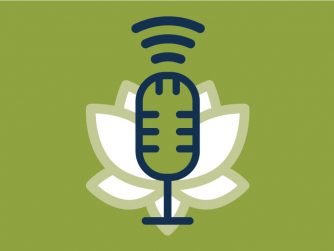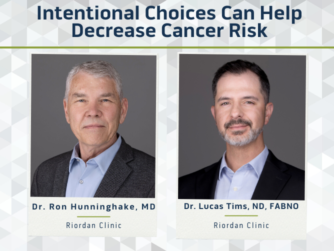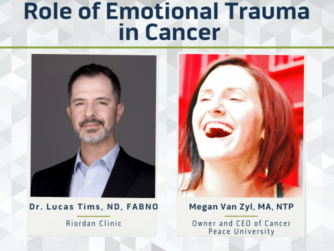Dr. Ron Hunninghake, MD, Chief Medical Officer, and Dr. Lucas Tims, ND, FABNO, end their discussion about the terrain approach to integrative oncology in this bonus episode of the Real Health Podcast. Today’s episode features the final three of the 10 terrains: circadian, stress, and emotions and their impacts on cancer. Dr. Ron and Dr. Lucas explain how genetics are only part of the equation when it comes to treating cancer and caring for the whole person.
Thank You To This Episode’s Sponsor
Episode Links and Promotions
Metabolic Terrain Institute of Health
Episode Transcript
Disclaimer: The information contained on the Real Health podcast and the resources mentioned are for educational purposes only. They are not intended as and shall not be understood or construed as medical or health advice. The information contained on this podcast is not a substitute for medical or health advice from a professional who is aware of the facts and circumstances of your individual situation. Information provided by hosts and guests on the Real Health Podcast or the use of any products or services mentioned does not create a practitioner-patient relationship between you and any persons affiliated with this podcast.
Intro: This is the Real Health Podcast brought to you by Riordan Clinic. Our mission is to bring you the latest information and top experts in functional and integrative medicine to help you make informed decisions on your path to real health.
Dr. Ron Hunninghake: Well, hello, everyone. This is Dr. Ron Hunninghake with another episode of the Real Health podcast here at Riordan Clinic. And once again, it’s my pleasure to welcome Dr. Lucas Tims back with us. Lucas, how you been lately?
Dr. Lucas Tims: Been great, been staying busy, and had some time to take a little vacation, so re-energized and ready to get back to helping a lot of patients here.
Dr. Ron Hunninghake: Well, we all need to take good care of ourselves, including the doctors, and so it’s surprising. This is a little tangent and it kind of goes along with what we’re going to be talking today. Doctors suffer a lot from stress and from illnesses relating to overwork and under sleep and those kinds of things. And so today, we are talking about the last, I guess you would say, triplet of the Terrain Ten, namely how disruption of the circadian system, stress, and emotions can increase your risk for cancer. And people say, “What? I mean, I’ve got a lot of stress, doctor, and you’re saying that’s going to increase … I thought it was just toxins and chemicals and family genetics. But you say this can cause cancer?”
Dr. Lucas Tims: Yeah, I think it’s not one of those things that gets talked about enough in terms of Western medicine, right? Because we like to have a physiological target or a pathway or a molecule or a lab that we can point to and say, “This is your problem.” Stress is more of a non-tangible. It’s hard to quantify. It’s hard for people to measure that, although we do have labs that can measure it. And most of the time, it requires the most amount of work and change to overcome because you have to really look at what you’re doing day in and day out with how you’re living your life, and that’s hard for people. But we do know that chronic, prolonged stress… some stress is good, right?
Dr. Ron Hunninghake: Sure.
Dr. Lucas Tims: We talk about adaptive stress and hormesis, and that’s what drives evolution and actually, positive type changes in the body, but too much chronic, prolonged stress suppresses the immune system, drives growth factors, and if you have a cancer brewing can certainly be like a lighter fluid on that fire.
Dr. Ron Hunninghake: Yeah. And a lot of people… tumor cancer is like a thing.
Dr. Lucas Tims: Right.
Dr. Ron Hunninghake: It’s the tumor, it’s the cells, and the whole Western approach is to attack the objective aspect of cancer. But if you think about in literature, people talk about a cancer in their family or a cancer in their business. So cancer has that kind of connotation of something hidden, something evil, something destructive that is lurking and causing harm. And certainly, that element of stress kind of fits that profile of how cancer can develop out of circumstances that are disrupting that person’s life.
Dr. Lucas Tims: Yeah. It can … I think our modern world here is it breeds stress. I think that a lot of people are living lives that we’re not meant to live. And with the chronic stress between work and family and health and all the things that people feel like they have to keep an eye on just to make it, just to survive their day. Just … I feel like we’re not living as closely with nature, either, as we probably are designed to.
So part of it, to me, is there’s things that drive chronic stress in our society and in people’s own day-to-day lives. But then, there’s also the lack of things that help us to manage and reduce that stress. And so, we’re not only taking on more stress, but we’re also getting away from the things that help us to de-stress, right? And so we’re almost getting hammered on both sides, and that’s why I think it can play such a huge role for people is that we’ve got this extra pressure on us every day, and we’re not doing the things that help our body manage that pressure.
Dr. Ron Hunninghake: Loss, the whole sense of loss. I’ve a lot of cancer patients have come in after the loss of a spouse or the loss of another family member or the loss of a-
Dr. Lucas Tims: Quite common.
Dr. Ron Hunninghake: … loss of a job or an important relationship, loss of independence, like a financial loss or something. And then here’s another loss, loss of sleep. People don’t think about this, but there’s some very hardcore evidence now that people who do shift work and don’t get regular sleep, they’re at a much higher risk of getting cancer.
Dr. Lucas Tims: Yeah. Another double whammy because it’s causing more stress and removing something that helps us to manage stress, which is that normal sleep cycle. But yeah, the emotional or losses or griefs or traumas, there’s a lot of unresolved trauma going around. I think that’s a normal thing in our society, but it doesn’t get talked about a lot. A lot of it can stem back to childhood, but sometimes, it’s something that happens just in that 18 months leading up to a diagnosis and then the diagnosis itself and going through the treatment becomes an additional stress or an additional layer of stress to manage.
So it very quickly can become overwhelming, which is why we try to focus a lot of our early work with our patients on how do we start implementing more even short routines on a daily basis that can help our bodies adapt and manage stress because it’s not enough to just be aware of the stress. We have to get our body … give it the support it needs and give it those release valves to take some of that pressure off, so that the body can find its way back towards more of a normal rhythm and not feel like you’re in that fight-or-flight state 24/7. That’s good if you’re in a life-threatening situation where you need to jump out of a burning car or run from a sabertooth tiger.
Dr. Ron Hunninghake: Tiger.
Dr. Lucas Tims: But we’re not meant to be in that state all the time, and a lot of people are living that way.
Dr. Ron Hunninghake: So just encouraging people to get back into a routine, maybe a bedtime. Just start going to bed about the same time every night and trying to get equal amounts of sleep. Get any sleep apnea issues cleared up.
Dr. Lucas Tims: Sleep apnea is huge, which is obviously related to obesity and a lot of the other things that we know are cancer risks, but that could be another additional … that link between obesity and sleep apnea we know is there, and that sleep apnea, what does it do? It creates more stress in the system. It prevents us from getting the restful sleep that promotes stress reduction. And then, as we’ve talked before, you and I, Dr. Ron, it creates a hypoxic environment, which is a hallmark of cancer.
Advertisement: There’s a lot more to this conversation, and it’s coming up right after a quick break. Today’s podcast is brought to you by Bio-Center Laboratories. The Bio-Center Laboratory provides state-of-the-art lab testing and diagnostic services for healthcare providers, laboratories, hospitals, and the general public. Lab tests available through Bio-Center include a comprehensive list of vitamins, minerals, fatty acids, amino acids, hormones, and pyrroles. We also provide a variety of standardized tests for disease markers. These markers include cardiovascular disease, diabetes, thyroid dysfunction, hormone imbalance, and more. Visit biocenterlab.org to learn more.
Dr. Ron Hunninghake: Cancer cells are regular cells that have shifted back to a different type of metabolism. This is the whole metabolic approach to cancer. If you’re hypoxic, you’re causing your cells to move in a cancerous direction. So these are all choices that people need to be making, and wouldn’t you say it would be good for people who are dealing with cancer to, if not to get direct counseling, maybe pastoral counseling, or just opening up with their family a little bit more about what they’re feeling, because oftentimes, some of the cancer patients I’ve seen feel kind of alienated and isolated because people sometimes are afraid of cancer. They don’t want to talk about it. And it just makes their sense of loss even greater.
Dr. Lucas Tims: Totally agree. There’s no one way to do it. There’s lots of pathways and avenues and things that you can do to sort out more chronic stressors, traumas, griefs. Some people choose more of a religious or spiritual route. Some people, counseling and just talking with trusted individuals helps them to release that. There’s more sort of newer, emerging type therapies like EMDR and things that can actually help reprogram how the body holds onto emotions and trauma. And so we try to provide patients with different options and then allow them to choose what route they want to take that resonates well with them.
But in the meantime, working on the sleep stuff, working on building in daily routines like meditation or some sort of mindfulness practice, spending more time in nature, breathing exercises or breath work. There’s a lot that can be done while you’re working on maybe what’s driving the underlying stress to help mitigate it, and that’s what we want to start with.
Dr. Ron Hunninghake: I recall that we have one of your patients there in Kansas City has been very successful with his cancer. And what’s the phrase that he uses? Every day, every way I’m getting healthier and healthier. Do you remember who I’m talk … you know who I’m talking about.
Dr. Lucas Tims: I know who you’re talking about, and I’ve heard him say that. And yeah, it is sort of his own personalized mantra for healing. And I’m a big fan of affirmations and mantras.
Dr. Ron Hunninghake: Affirmations. Yes.
Dr. Lucas Tims: And they don’t need to be … you can take someone else’s and use it. You can form your own, but those can be very powerful, especially if they’re done consistently. That’s really … the patients that I see that do the best with cancer, no matter what, early stage, late stage, there’s always this common denominator or common component of they’re very consistent with their habits, their positive habits, whether that’s mental, emotional stuff or eating well or exercise. They’re very, very consistent. And so that consistency, whether it’s your affirmations or mantras or working on your sleep or meditation, consistency is key. And I think that’s where a lot of people … they dive into this stuff, but then they don’t keep it up.
Dr. Ron Hunninghake: The book that kind of goes into this is a book called “Radical Remission,” where there were nine different things that people did that allowed them to get into remission. And I think it was five out of the nine had to do –
Dr. Lucas Tims: Seven.
Dr. Ron Hunninghake: … seven out of the nine had to do with mind-body type things that people were doing, just taking control of their life, believing that they could get better, getting the spiritual support that they needed. These are things that we don’t think of. When it comes to treating cancer, we’re chemotherapy, radiation, but these nonmedical life changes can be very powerful ways for people to overcome what oftentimes seems like an impossible illness to get over.
Dr. Lucas Tims: Yeah. And that’s been actually quantified, and I believe that is what makes up most of what we term as the placebo effect. And we know that the placebo effect outperforms most drug therapies when it comes to cancer. It can be as high as 40 percent. And there’s been research that’s been done, a great book called “Molecules of Emotion” by Dr. Pert. There is … the mind does act on the physical body to produce physiological changes.
And so it’s more important that you have a game plan and that you’re bought in and that what your game plan is resonates with you rather than saying, “Well, it has to be exactly this or exactly that.” It’s more important that the belief is there, and that’s where it can be very different, patient to patient, in terms of how they approach it.
Dr. Ron Hunninghake: Yeah. So this is the final segment of looking at the Terrain Ten, and really in many ways, the metabolic approach to cancer is where people are taking more effective control of their choices in all realms – what they eat, how they exercise, their toxicity, their sleep, their inflammation. All these are areas that we have say so in, and so many times, I want my patients with cancer to stand up and say, “I am taking control of my life now because what I do may make as much of an importance as what the doctor says I should do. Maybe more.”
Dr. Lucas Tims: Totally agree. And this is where we see patients where cancer can sometimes be, I know it sounds terrible to say this, but the best thing that ever happened to them because it’s like a wake-up call. It forces them to do the work. And there’s no motivation like a life-threatening illness for people to make some really hard decisions and changes that may be difficult in the beginning, but long-term, are going to put them in a much better place and allow them to live closer to the life that they’re supposed to live.
Dr. Ron Hunninghake: It’s true. And it’s strange that in our lives, sometimes, it takes this level of kind of threat to kind of wake up, but cancer can be an amazing wake-up call for people. And so certainly, here at the Riordan Clinic, we’re doing all we can to help our patients in every way integrate these naturalistic therapies as a legitimate part of a healing program.
And so Dr. Tims, thanks so much for all you do and your investment in this with your patients and the fine comments that I keep hearing about your care. So we’ll be back, though, to talk more about these issues, but thanks again.
Dr. Lucas Tims: My pleasure, Dr. Ron. It was great going through all this with you. And this is just the beginning in terms of how we can help patients through this metabolic process and approach. So we’re always learning more, but for now, this does give us a very solid foundation in order to help patients to fill in all these gaps and make these changes, and so hopefully this information has been helpful for at least having people have the awareness and maybe take those first few steps.
Dr. Ron Hunninghake: Absolutely. Thanks again.
Dr. Lucas Tims: Thanks.
Outro: Thank you for listening to the Real Health podcast. If you enjoy this episode, be sure to subscribe and leave us a review. You can also find all of the episodes and show notes over at realhealthpodcast.org. Also, be sure to visit riordanclinic.org, where you will find hundreds of videos and articles to help you create your own version of real health.




